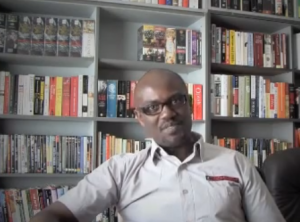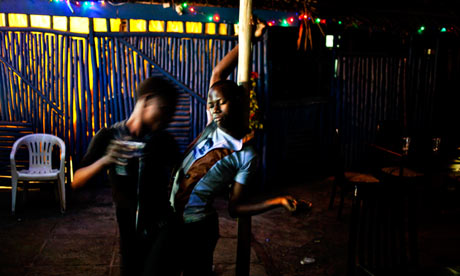By Melanie Nathan, February 09, 2013.
 Andrew
Mwenda is one of the few straight and reasonable voices to speak to
the issues surrounding the Anti- homosexuality Bill in Uganda. He is an
outspoken journalist who provides this video recording below as an
explanation, with his reasoning, why the West should not cut AID to
Uganda as a solution to the Anti-homosexuality Bill - and he provides a
controversial desensitization suggestion.
Andrew
Mwenda is one of the few straight and reasonable voices to speak to
the issues surrounding the Anti- homosexuality Bill in Uganda. He is an
outspoken journalist who provides this video recording below as an
explanation, with his reasoning, why the West should not cut AID to
Uganda as a solution to the Anti-homosexuality Bill - and he provides a
controversial desensitization suggestion.
The
otherwise known " The Kill the Gays Bill," has been languishing in the
political arena in Uganda, with a few Parliamentary introductions since
2009. It is currently poised for passage at #6 on last Week's Parliamentary Agenda.
In
this video Mwenda notes that 90% of Ugandans are homophobic and so he
believes that cutting AID by the West is a counterproductive and
antagonist approach which will not serve to educate Ugandans about
homosexuality. He believes that a discussion of the issue and engagement
over time will help to change attitudes in Uganda. He also suggests
that the tabloid red pepper exposure of the gay sex act, could help
desensitize Ugandans.
While
I applaud Mr. Mwenda's stance and fully understand his reasoning,
especially on the issue of sovereignty, it brings up a few issues for
me, some which I think he may have missed.
Firstly
he makes the cardinal mistake of equating homosexuality with the act of
sex, by suggesting that if people see more images of the actual sex act
between two men, they will become desensitized. I am sorry to inform
Mr. Mwenda that such an idea demonstrates that he is falling into the
very trap that exacerbates homophobia in the first place.
Homosexuality is not about the act of sex or sodomy. That is how it has
been sold as a negative concept in Uganda. You have people like crazy
Rev. Martin Ssemba ranting on and on about the act of sodomy. You have
David Bahati the author of the Kill the Gays Bill, justifying death to
homosexuals with his interpretation of Sodom and Gomorrah.
So
all Mwenda is really doing in this video discussion is perpetuating
myth. Homosexuality is not about the act of sex. It is about two people
of the same gender being attracted to each other and having a loving
relationship, in respect of which sex is incidental. Surely
heterosexual people should understand that sex does not define their
entire relationship?
Indeed
one cannot force cultural change over night. But it is myth and lies
that need to be countered and then maybe Ugandans will understand that
homosexuality is not a cultural issue. It is a human issue. Sexuality is
a human right. Ugandans do not understand this - that all humans -
regardless of culture have the same innate sexuality experiences.
Thinking otherwise is like saying your brains and blood is different. It
is the lack of understanding that is cultural and that can be remedied
with truthful debate and a strategic re-education. The latter needs to
be a mission, at the very least, of the Christian colonialists and
Evangelicals who started the lies in the first place.
1.
The issue of Sovereignty: - Indeed all countries must make their own
laws unfettred. But now Uganda is seeking to make a law based upn a
belief system supported only by myth and lies, as injected by white
colonialists and Evangelical zealots. Surely Mr. Mwenda a much more
effective dialogue than one of mere infusion ought to be called for.
Surely some worthy leadership from the straight community such as your
good self is called for. This would need to be much more proactive
before you can expect the world to simply accept that Ugandans can so
legislate.
Take
South Africa as an example. How many more years would the South
Africans have had to wait for the Afrikaner Government to get the
message.,. It was sanctions that brought them to their knees on the
issue. And it matters not whether a majority or minority of the
population was impacted. it is all the same when you speak about
sovereignty.
2.
The issue of global participation: I agree, AID ought not be cut for
the reason of homophobia. However if it is cut it should be because of
Uganda's huge incidence of corruption - and not because of the
Anti-homosexuality Bill. The latter will just cause a backlash and
further scapegoating gays. So I agree in principle. However what Mwenda
does not seem to realize or simply omits is that some international
corporations have a presence in Uganda, such as Barclays Bank and
Hilton hotels. These companies have all inclusive hiring diversity
policies on their website, and purposefully reach out to LGBTI people.
Does Uganda expect these companies to stay in Uganda and conform to
their homophobia or do Ugandans respect their independence and right to
their views too?
So
while different to cutting AID, I have no doubt many businesses will be
forced to stop doing business with Uganda and will be forced to stop
operating in Uganda, because the new Anti-gay law will make it
operationally impossible. remember the new law requires that an employer
turn over a known gay within 24 hours or that employer can face three
years in prison. no western busines in its right mind will continue to
operate under such threat.
Mr.
Mwenda you are a great voice for reason- however stop being an
apologist and look at more productive ways to have this conversation at
this time. Using the issue of asking that AID not be cute and the
suggestion of more visual gay sex is hardly a strategy. There is no
time to waste for those whose lives will be dramatically impacted by the
Bill. There is no time to spend - for an entire generation to go by
before education by infusion works; certainly not in a climate where
there has been active promotion of the hate.
Andrew
Mwenda is still a great ally and an important voice and I do not
purport to understand Ugandans better than he does, however I believe
strongly that it is time for people in his capacity to introduce a much
more productive and proactive route toward the truth about homosexuality
for presentation to Ugandans.
About Andrew Mwenda:
A Ugandan journalist, founder and owner of The Independent, Uganda's premier current affair's news magazine, he attended Busoga College Mwiri in eastern Uganda before attending Makerere University. He was arrested and released on bail by the Ugandan government for "being in possession of seditious material and of publishing inflammatory articles". He earned a master's degree in Development Studies at the University of London in the UK. He was previously the political editor of The Monitor newspaper and presenter of Andrew Mwenda Live on the KFM radio station. In 2005, he was among sixteen senior journalists invited by the British government to meet prime minister Tony Blair to discuss the forthcoming report of the Commission for Africa.In August 2005 he was charged with sedition for broadcasting a discussion of the cause of death of Sudanese vice-president John Garang.In July 2006, Mwenda appeared before the British House of Commons committee on Global Poverty to testify against aid to Africa. He has written widely on the effects of aid on the development process in Africa and been published in such prestigious newspapers as the International Herald Tribune and Der Spiegel and done radio and television documentaries for the BBC on this subject. Mr. Mwenda has also been widely quoted in international media - BBC, CNN, New York Times, Washington Post, The Times, The Economist, and many other newspapers, radio and television networks in Europe and North America.He has assiduously criticised aid agencies and charities for what he says is their ineffectiveness and collusion with corruption. He believes that western aid has been largely unhelpful for African development, since it encourages dependency, sustains wars and fuels corrupt states. He argues that aid goes to the least deserving states, those that have failed their people, rather than those that have reformed. In June 2007, he gave a speech about these issues at the TED conference in Arusha, Tanzania.In 2008, he won an International Press Freedom Award from the Committee to Protect Journalists. The award is given for journalists who show courage in defending press freedom in the face of attacks, threats or imprisonment.

